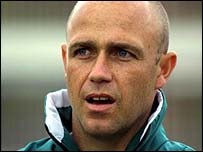Cricket Mental Training: A Personal Reflection
 Inner Space : The Final Frontier
Inner Space : The Final Frontier
As a child one of my favourite TV programs was Star Trek, there was a great quote which Captain Kirk used to say at the beginning of each episode….
‘Space… the Final Frontier. These are the voyages of the Starship Enterprise. Its five-year mission: to explore strange new worlds; to seek out new life and new civilizations; to boldly go where no man has gone before.’
I believe the final frontier in cricket is in the inner space of the brain and mind, understanding how they can be directed and managed for optimal performance with mental training.
Sports Psychology has made small inroads into cricket, but certainly not as substantially as it has into tennis and golf, both amateur and professional.
One of the stumbling blocks of sports psychology is that it has been seen, rightly or wrongly, as a field which is beyond the interpretation of the average player or coach.
Its mystery has been deepened by the language that social scientists use to describe their field, which cloaks it in a ‘Da Vinci Code’ type shroud, inaccessible to all those that don’t speak that language.
Other terms have come into common usage such as ‘Mental Toughness‘, what exactly does this mean, how would we become mentally tough?
Is mental toughness a sales spin or is it somethng that players and coaches can understand and use ?
We live in an age where brain science, or Neuroscience as it is called, has made far reaching discoveries beyond the theory of social science and into the facts of the brain and the operation of the mind.
This is not to pooh-pooh Sports Psychology, it has been hugely beneficial to thousands of athletes.
It is more about looking at what is best in Sports Psychology and neuroscience, and add to them the relatively new fields of Mental Training, NLP ( Neuro Linguistic Programming) and Sports Hypnosis, so that players and coaches can access them and use them to improve performance, both personally and that of their teams.
More of that later…
Cricket Mental Training: My Personal Journey
My success as a cricket coach has been through applying mental training with cricket teams and players to help them achieve collectively and individually.
My personal journey as a coach has gone through three distinct phases.
Firstly, as a young cricket coach I thought the game was all about cricket technique, the dominant focus of the game in every cricket coaching book I read was on technique, technique, technique.
I believed that helping a player with his technique would lead them to play better.
This was only sometimes true, it became apparent that helping someone with a technical aspect of their game wouldn’t necessarily help them focus better, fill them with confidence or assist them to manage their game better emotionally.
Did cricket technique have all the answers, certainly not.
I was to suffer a series of injuries that put paid to any ambitions I had of being a professional cricketer.
Having done well in Minor Counties Cricket in England and been invited to start with several first class counties I proceeded to have four operations in four summers. At the end of this, time had moved on and I needed to work full time to generate a living.
The gift of this episode is that I studied biomechanics and conditioning in seeking answers as to why I had had so many injuries, was it biomechanical or was it poor conditioning for fast bowling that was the reason.
So, in getting an understanding of these fields I had a broader range of skills to be able help players, but cricket technique, biomechanics and strength conditioning still didn’t have all the answers.
About the time of the first injury I came across a book that would ultimately change the way I coach and prepare players and teams.
A friend had a copy of Terry Orlick’s Sports Psychology book ‘In Pursuit of Excellence’.
Not only did the book grab my interest, but even better, it had practical exercises in it to get busy with.
At the time I was playing league cricket, I couldn’t train during the week because of a groin injury which would ultimately need two opersations.
The injury would be aggravated by playing, but I could get through one game a week and then recover for the next six days and play again a week later.
This was absurd for me, I loved to train and had to train alot to keep the ‘feel’ of my bowling action. It didn’t really work until…
I applied the exercises in Orlick’s book, specifically sections onVizualization and Self Hypnosis.
I followed the instructions and wrote out a bowling script, using the self hypnosis-relaxation exercise with the visualization and positive self talkbuilt into it.
So what happened…..
I listened to the performance script every night before I went to sleep…. falling into a deep peaceful sleep afterward.
Week after week I began to bowl better than I had ever bowled before, with no practice other than the mental skills work.
Now, my question to myself, from someone who loved training and needed to train to develop and keep the ‘feel’ of his game, was how is it possible to play better with no practice ? This is anti logic and counter intuitive, nothing works like this, do less, perform better.
So what was really going on ?
Simply put, I had wired into my brain exactly what I wanted to do and make happen when I bowled.
The script had the actions, the focus and the emotions all written into it.
When I began with the deep relaxation exercise my conscious mind quietened down and my subconscious mind was then open, quiet and very receptive to ‘experiencing’ the visualization exercise and accepting the positive affirmations.
The script had simple goal setting built into it, thus the brain had a goal orientation and direction.
It had performance breathing skills built into it, which allowed me to manage my emotions and keep my mind present, calm and focused.
Many of these things had been areas I had battled with previously and here they were being taken care of on automatic pilot.
I wasn’t having to consciously pay attention to them as they were largely non issues, the positive management of my focus and emotions was being taken care of by my subconscious mind.
I had got out of my own way … or to put it more accurately, I had got my conscious mind out of the way, with its fears and anxieties and was allowing my subconsciously learnt skills to play on automatic.
It was the most wonderful and serene feeling.
Lets have a look at Olympic Athlete Marilyn Kings’ story and see what the similarities are.
Back To Cricket Mental Training

About Richard Pybus
I'm Richard Pybus, I've coached Pakistan, Bangladesh, Middlesex, Titans and the Cape Cobras in South Africa and the goal of this site is to help you to play winning cricket.
